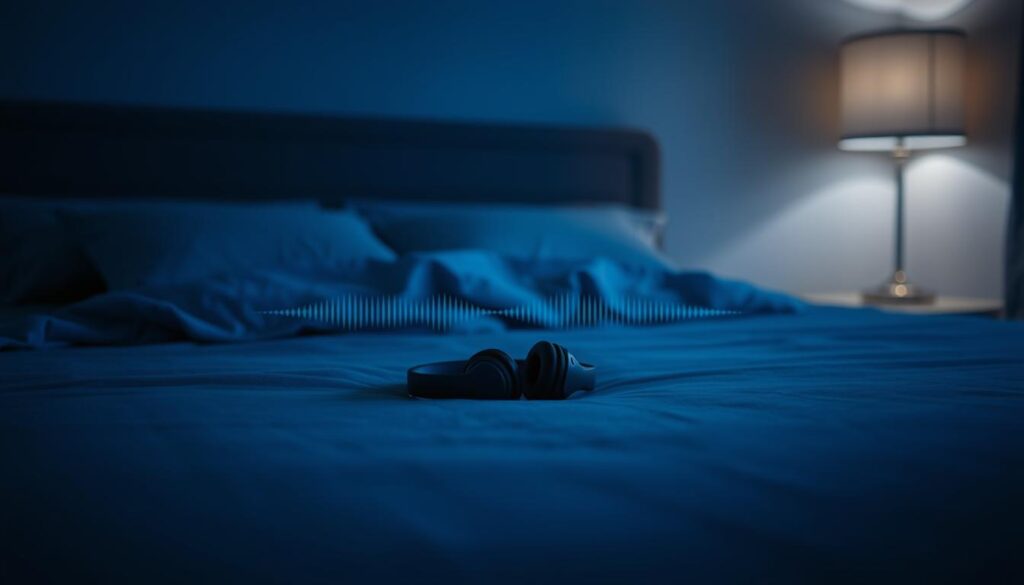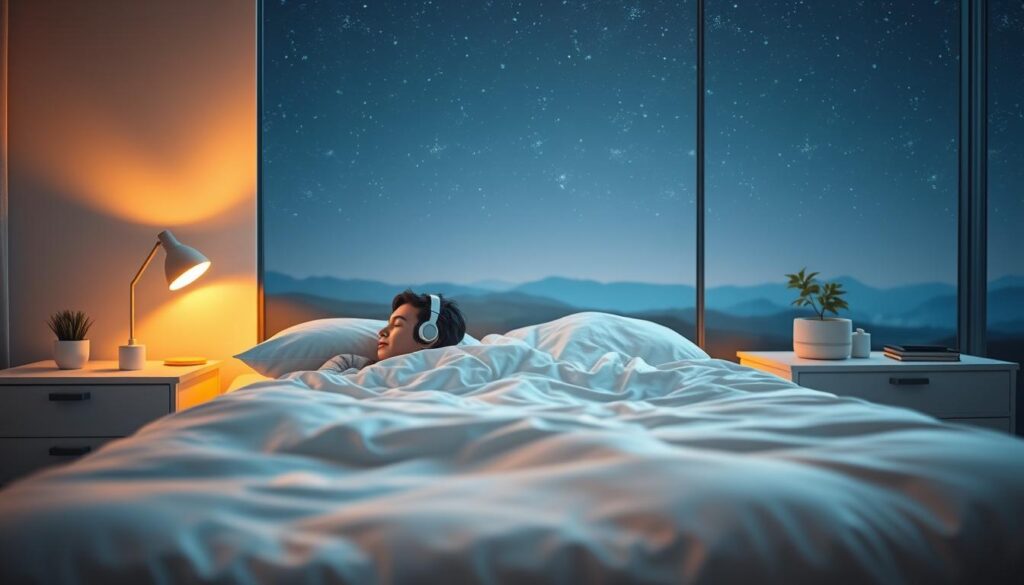Millions of Americans struggle with sleep. They look for new ways to rest better. Binaural beats for sleep are a promising tech solution.
Research shows how binaural beats work. A study with 20 healthy people showed great sleep gains. They fell asleep faster, from 19.1 minutes to 7.23 minutes.
These people also slept longer, from 6.05 to 7.3 hours. They woke up less, from 2.06 to 1.06 times. And 70% said their sleep was good to excellent.
Binaural beats do more than just help sleep. They also lowered anxiety and boosted mood. This shows they improve mental health too.
As sleep issues keep affecting work and health, binaural beats are a safe, science-backed way to sleep better.
Understanding Binaural Beats and Their Functionality
Binaural beats are a cool sound trick that helps people relax and sleep better. They are a new way to find peace and get good sleep without medicine.
Binaural beats happen when you hear two different sounds in each ear. Your brain makes a third sound that is the difference between the two. This special sound can change how your brain works.
What Are Binaural Beats?
Binaural beats are special sounds that make your brain waves match. They help you relax and sleep better. They work by making your brain feel a single sound that guides it into calm states.
- Created by presenting different frequencies to each ear
- Perceived as a single, unique tone by the brain
- Can potentially influence brain wave patterns
How Do Binaural Beats Work?
Your brain is great at hearing tiny differences in sound. Binaural beats use this to make you feel certain ways. They can help you relax and sleep better by changing your brain waves.
The Science Behind Sound Frequencies
Studies show how sound affects our brains. Delta waves are linked to deep sleep. Binaural beats might help people sleep better by making their brain waves match these sleep waves.
Seventy-three percent of people had more melatonin after listening to binaural beats. This shows they could be a natural way to help you sleep and relax.
The Impact of Sleep Quality on Health

Sleep is key to staying healthy and feeling good. It helps us perform well and recover. Sound therapy and brainwave synchronization are new ways to better sleep.
Sleep does more than just help us rest. It’s vital for our bodies to heal, manage emotions, think clearly, and keep our immune system strong.
Importance of Good Sleep
Good sleep is good for our brains. It helps us remember things, solve problems, and stay sharp. Techniques like brainwave synchronization can make sleep even better.
Consequences of Poor Sleep
Poor sleep can lead to big health problems. Not getting enough sleep can increase the risk of heart disease, brain issues, poor thinking, and a weak immune system.
How Sleep Affects Cognitive Function
Sleep greatly affects how our brains work. Binaural beats and sound therapy can help our brains sleep better. They make us better at remembering, learning, and staying mentally strong.
With 27% of people worldwide having sleep issues, it’s more important than ever to focus on sleep quality. This is key for staying healthy and feeling good.
How Binaural Beats Can Enhance Sleep

Getting good sleep is hard in today’s busy world. Binaural beats can help improve sleep quality. They also help with sleep problems.
Binaural beats offer special ways to relax. They use sound frequencies to match your brain’s natural rhythms. This helps you sleep deeper and better.
Promoting Relaxation and Reducing Anxiety
Anxiety can make it hard to sleep well. Binaural beats have shown to help manage stress:
- They lower cortisol levels by up to 70%
- They reduce anxiety a lot
- They increase melatonin by 93%
Facilitating Deeper Sleep Cycles
Delta-frequency binaural beats (0.5-4 Hz) help with deep sleep. Studies show these frequencies can:
- Make sleep more restorative
- Improve sleep quality
- Shorten time to fall asleep
Enhancing Sleep Onset
For those who can’t fall asleep, binaural beats are a natural fix. Experts say to listen for 15-30 minutes before bed. This helps prepare for sleep.
Even though binaural beats are promising, results can differ. Always talk to a healthcare professional for ongoing sleep issues.
Choosing the Right Binaural Beats for Sleep

Finding the perfect Sound Therapy solution for sleep can change your nights. Binaural beats target brain waves for relaxation and deep rest.
Different Delta Waves frequencies can greatly improve sleep. Here’s a guide to pick the best binaural beats:
Types of Binaural Beats for Sleep Improvement
- Delta Waves (0.5-4 Hz): Great for deep, restorative sleep
- Theta Waves (4-8 Hz): Helps with light sleep and meditation
- Alpha Waves (8-13 Hz): Encourages relaxation and lowers anxiety
Recommended Listening Frequencies
Research shows the best results from specific listening:
- Listen for 15-30 minutes before bed
- Use 1-4 Hz for deep sleep
- Go for 4-8 Hz to boost REM sleep
Where to Find Quality Binaural Beats
When looking for Sound Therapy, consider these tips:
- Reputable music streaming platforms
- Specialized sleep and meditation apps
- Professional audio with scientific support
An eight-week study on young athletes showed better sleep with 2-8 Hz binaural beats. 73% had more melatonin, making these tracks a natural way to fight insomnia.
Incorporating Binaural Beats into Your Sleep Routine

Looking for Natural Sleep Aids can change your sleep. Binaural beats are a special way to help you relax and sleep better.
It’s important to create a calm place for binaural beats. You need a quiet spot that helps you get ready for sleep.
Best Practices for Effective Listening
- Use high-quality headphones for precise sound delivery
- Choose a quiet, comfortable space free from distractions
- Start with low volume to avoid overstimulation
- Experiment with different frequencies tailored to sleep needs
Creating the Ideal Sleep Environment
Your bedroom should be a calm place. Think about these things:
- Maintain a cool room temperature (60-67°F)
- Minimize light exposure
- Use soft, comfortable bedding
- Eliminate electronic device distractions
Timing and Duration of Use
Listen to binaural beats 30-45 minutes before bed. Using it regularly trains your brain for sleep. This makes Natural Sleep Aids work better.
Everyone is different. Be patient and try different things to find what works best for you with binaural beats.
Research and Evidence Supporting Binaural Beats

Scientists have been studying Brainwave Synchronization. They found interesting facts about Brain Wave Entrainment and Sound Therapy. They looked into how binaural beats might help with sleep and thinking.
Scientific Studies on Sleep Quality
A big review of fourteen studies showed some cool things about binaural beats. The findings were quite varied:
- Five studies backed the brainwave entrainment idea
- Eight studies found opposite results
- One study had mixed results
Key Research Observations
Studies found that binaural beats can be heard in the 1-30 Hz range. This range matches the main brain wave frequencies. But, how well people can hear these beats can differ a lot.
Expert Perspectives on Effectiveness
Research shows binaural beats can cause certain brain responses. But, experts say we need more standard research to compare results better.
Even so, the research is promising. Binaural beats might help with sleep, but they’re not the only answer. More studies are needed to see how Sound Therapy can improve sleep and thinking.
Potential Limitations and Considerations
Binaural beats might help you sleep better, but use them with care. Studies show mixed results, with a 2023 review of 14 studies finding no clear answer. It’s important to keep sound levels low, below 85 decibels, to protect your hearing.
If you have health issues or take certain medicines, talk to a doctor first. People with epilepsy or wearing hearing aids need special advice. Everyone reacts differently, so what works for one might not work for another.
Binaural beats can be part of a bigger plan to improve sleep. Use them with good sleep habits, stress management, and regular sleep times. Try different frequencies and sounds to see what works best for you.
For the best sleep, tailor your approach. Binaural beats can be helpful, but use them wisely. Always watch how you react and keep sound levels in check.
